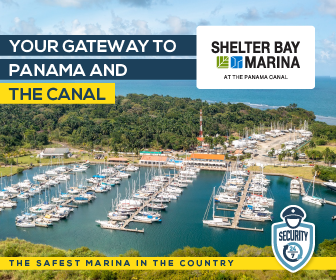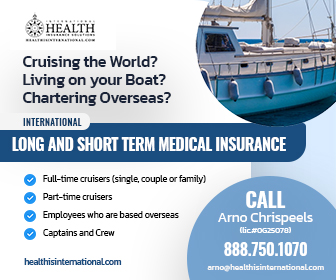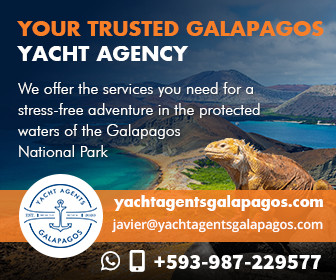Fees for Cruising Boats in the DR
Following a number of recent enquiries concerning the fees to enter into the DR, Frank Virgintino, author of the Free Cruising Guide to the DR, clarifies exactly how the system works.
Published 9 years ago, updated 6 years ago
There have been a number of inquiries of late concerning the fees to enter into the DR. This subject is covered in the Free Cruising Guide to the DR and on Noonsite.
The Dominican Republic does not have a separate law governing pleasure craft and essentially treats all vessels as if they were commercial craft. As time goes by this will change, but it is the way it is for now. The same is so in other countries that are newer to receiving cruising boats and Colombia and Mexico would be good examples.
Fees for Clearing-in
The fees for clearing are $73 US for the boat and $18 for each 30-day visa; easily renewable.
Use of an Agent
If you use an “agent” to help you clear in, with the cost of the Agent’s time and the Agent paying all the tips as well as transportation to the various offices and for various officials, the average “all in” cost is about US$250.
Authorities for Clearance
The Coast Guard is in charge of the process, but they will arrive with M-2 (Intelligence services), DCD (Drug enforcement) and Immigration. Sometimes, in certain locations, a produce inspector will come as well. Customs rarely comes personally but does assess a small fee in most ports.
Anyone can clear on their own, but you must be prepared to put in a full day’s work. You can also insist that you only want to pay the fees mentioned above. Culturally, however, those rendering the service expect a tip for their work as they consider it part of their salary.
Tips
In the DR the average official earns US$150 per month. Tips are normal practice in the DR for services and it is expected that you will tip clearing in, if not clearing out as well. A Domestic clearance requires the least effort and no one expects much for the service. A normal clearing from outside the country requires a few agencies and every agency will want a tip.
The most complex clearance is to the USA or possession of the USA. The DR has an accord with the USA for drug interdiction which adds to the burden of the process. Dogs are brought onto the vessel and if a vessel has been in the DR for a long period of time, Interpol must also be consulted to check the background of the owner.
In the Bahamas, you do not need to tip, but you do need to pay US$300 (approx.) to clear in and out. Those that write to me and tell me that they have been “ripped off” in the DR are referring to the need to pay charges that are not listed and fees.
In the DR, you should consider that “taxation” is direct to the consumer, wherein a country like the Bahamas, it is indirect and administered through the central government. Much depends on the history and development of the country as to how they do it. Most “Anglo” speaking countries in the Caribbean have a fee and tips are not required. Most “Latino” countries have a culture that uses tips as part of the normal pay scale and they are not considered optional. Many cruisers think of tips as optional and thus when forced to pay a tip feel “ripped off.”
Non-Listed Fees
Once you pay to clear in, if you move around in the country ALL THAT IS REQUIRED is to obtain a new DESPACHO to go from one harbour to the next. The average tip value of a Domestic Despacho is $15 to $20 US. When you arrive at the next harbour you surrender the Despacho and when you depart you obtain a new Despacho.
If you are departing the DR, you will need an International Despacho. Unless you are departing to the USA or one of its possessions, such a Despacho is similar to a Domestic Despacho and requires only a trip to the Coast Guard who prepare it; $15 to $20. If it is the USA, Puerto Rico etc, they must bring the dogs and extra people and the “tip” for these services is normally about $50 US.
Conclusion
If you feel that you do not like dealing with tips and all that goes with the process, you should avoid the DR and countries like it as it is their way of life. If you accept it and pay the going “tip rate”, you will find that the amount requested for the services offered is usually within range throughout the Caribbean if you factor in, additional required costs and other services for “non-tip” type countries in the Caribbean.
For instance, if you want to renew your visa in the DR, you pay to renew it without complication based on the posted DR government rates for time spent in the country; figure about $18 per person for every 30 days. In other countries in the Caribean, renewal of a visa can be a time consuming and costly process.
Many of the countries in the Caribbean charge for water. In the DR in most locations, there is no charge for water. The water is never potable and you should plan to have adequate potable water on board. Throughout the DR, they sell 5 gallons purified potable water for $1 US. You need to pay for the container only once, about $5 US and then can return it for credit when you get your refill and they give you a new 5-gallon bottle.
The DR is a large country and for the cost of the charges to clear in, most find the value equation well worthwhile.
Frank Virgintino
Related to following destinations: Dominican Republic, USA







